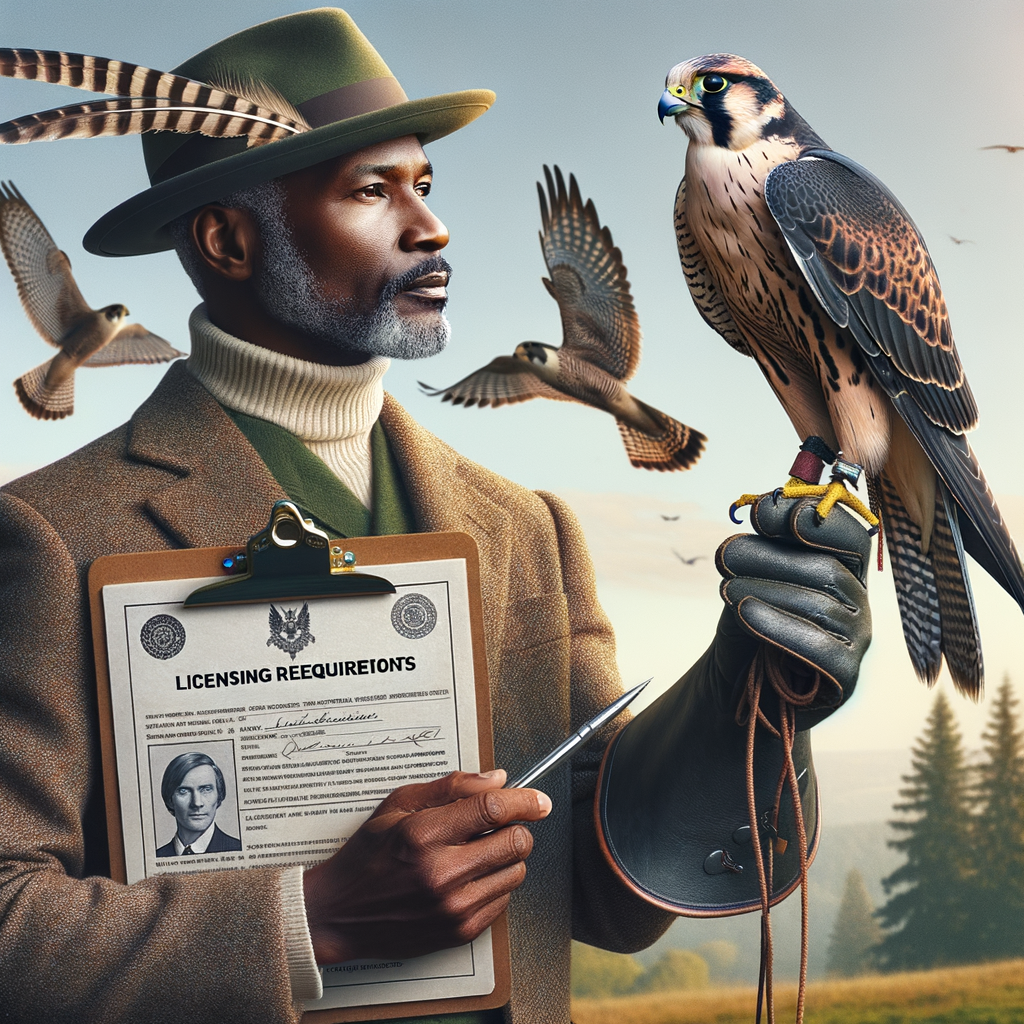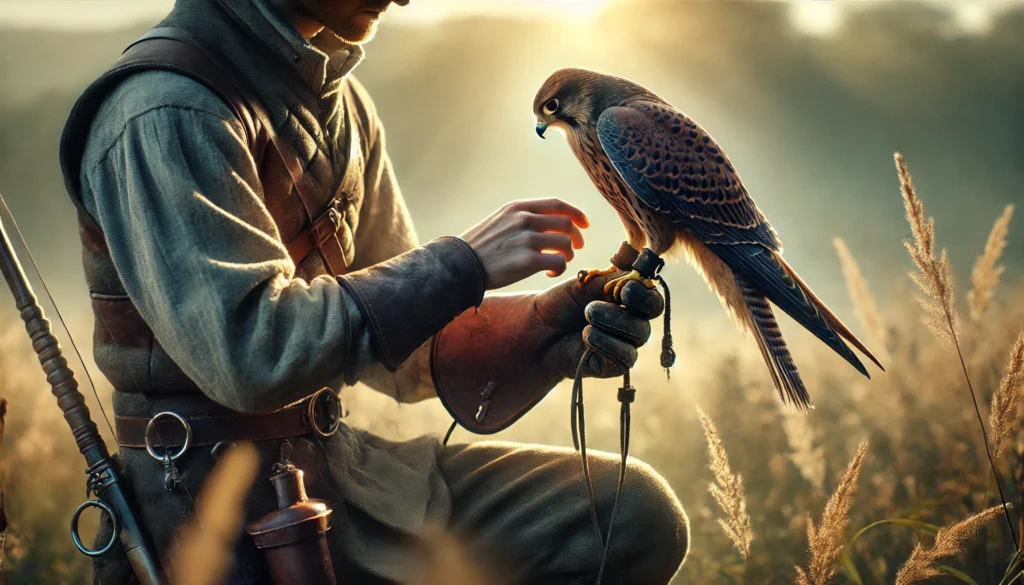Essential Falconry Licensing Requirements: Key Insights
- Know Your Local Laws: Falconry laws and regulations vary depending on your location. Always check your local requirements before starting.
- Understand the Licensing Levels: There are different levels of falconry licenses, often starting with Apprentice, then General, and finally Master. Each level has specific requirements and permissions.
- Mentorship Matters: Beginners usually need a mentor or sponsor, who is an experienced falconer, to guide them through the learning process.
- Pass Written Exams: Each level of licensing often demands passing a written test that covers knowledge about birds of prey, falconry techniques, and regulations.
- Bird Housing Regulations: Your facility for housing birds, known as a mews, must meet specific standards. These regulations ensure the health and safety of the birds.
- Bird Acquisition Rules: You can only obtain birds of prey from authorized sources, and in some regions, you may need special permits for specific species.
- Hunting Permissions: In many places, falconers must also have hunting permits if they intend to hunt with their birds.
- Maintain Accurate Records: Documenting your falconry activities, such as bird acquisitions, transfers, and annual inspections, is crucial for retaining your license.
- Health and Safety Compliance: Regular health checks for your birds and appropriate medical care are necessary, often requiring collaboration with a qualified veterinarian.
- Know Your Equipment: Certain falconry equipment is mandatory, including gloves, leashes, and perches. New practitioners must understand how and when to use them properly.
- Regular Inspections: Authorities might perform periodic checks on your birds and facilities to ensure compliance with all regulations.
Unlocking the Secrets of Falconry Licensing
Hey there, future falconers! Fancy learning about falconry licensing requirements? Well, you’re in for a treat because we’re going to dive into the captivating world of falconry and why these licenses are as crucial as a shamrock is to Ireland. Imagine falconry licensing like the keys to a castle—without them, you can’t just waltz in and explore the magical halls of this ancient practice.
So, buckle up and keep reading to uncover the steps to obtaining your falconry license. Trust us; it’ll be as delightful as a stroll through the Irish countryside, with plenty of fascinating tidbits to keep you entertained and well-informed. Ready to soar with us? Let’s get started!
Understanding Falconry Licensing Requirements
Falconry is a unique blend of sport and conservation, capturing the hearts of enthusiasts and promoting a deeper connection with nature. However, to participate legally, obtaining the correct falconry license is crucial. This guide will walk you through the essentials of the falconry licensing requirements, falconry permits, and the falconry licensing process.
What is a Falconry License?
A falconry license is an official permit that allows individuals to practice falconry. This license ensures that falconers adhere to specific regulations designed to protect both the birds of prey and their natural environment. Falconry has a rich history, and learning its legal aspects is an important step for any aspiring falconer.
Types of Falconry Licenses
There are generally three levels of falconry licenses:
- Apprentice Falconer: This is the entry-level license for beginners. As an apprentice, you’ll work under the supervision of a licensed General or Master Falconer. Apprentices typically start with fewer species of falcons, like the American Kestrel or Red-Footed Falcon. For more information, visit Falconry for Beginners.
- General Falconer: After a minimum of two years as an apprentice, you can apply for a General Falconer license. This allows you to keep and train more species of falcons and hunt without strict supervision. To learn more about different species of falcons, click here.
- Master Falconer: After five years as a General Falconer, you can apply for the Master Falconer license. This license allows for the training and keeping of any legal bird of prey species and greater autonomy in falconry practices. Explore Advanced Falconry for more expert insights.
Obtaining Falconry Permits
Steps to Get a Falconry License
- Educational Requirements:
- Most regions require aspiring falconers to pass a written exam that covers various aspects of falconry, such as bird anatomy, falconry equipment, and legal regulations. For basic information, check out Getting Started in Falconry.
- Finding a Sponsor:
- As an apprentice, you’ll need a sponsor who is a licensed General or Master Falconer to guide you through the initial stages. Discover more about Joining Falconry Clubs and how they can help.
- Facility Inspection:
- Your housing facilities, known as ‘mews,’ must meet specific standards to ensure the welfare of your birds. Learn more about proper mews setup in our article on Falconry Equipment.
- Field Experience:
- Practical experience is essential. Apprentices must log hours of hands-on training under their sponsor’s supervision. Gain insights into various Falconry Techniques and methods.
- Application Submission:
- Once all the prerequisites are fulfilled, you can submit your application along with the necessary documentation and fees. For detailed procedures, read our section on Legal Aspects of Falconry.
Importance of Complying with Legal Standards
In addition to personal fulfillment, adhering to falconry licensing requirements ensures the ethical treatment of birds and promotes conservation efforts. Licensed falconers contribute to ecological balance and the preservation of raptor species. Explore more on Falconry and Conservation.
By understanding and following the falconry licensing process, you can enjoy this ancient sport responsibly while contributing to wildlife conservation. For continuous learning, delve into the History of Falconry and Modern Falconry Practices.
Embark on your journey in the world of falconry by being well-informed and prepared. The adventure awaits!
Falconry Licensing Requirements in 2024
Falconry is an ancient and highly regulated sport where falconers work with birds of prey to hunt in partnership. To become a falconer, you must follow strict licensing requirements. Here’s an overview of the licensing process in 2024 for different states, with relevant information presented in a friendly and informative way.
California
- Nonresident Falconer Application:
- The application period for the Special Raptor Capture Drawing is open through the Department’s Automated License Data System. This can be done at license agents, Department license offices, and online.
Texas
- Falconry Seasons:
| Bird Species | Season Dates |
|---|---|
| Dove | November 17 – December 3, 2023 |
| Duck (North & South Zones) | January 29 – February 12, 2024 |
| Rails, Gallinules, Moorhens | January 29 – February 12, 2024 |
| Woodcock | January 29 – February 12, 2024 |
- Extended Falconry Season:
- Migratory game birds can be taken by means of falconry from one half hour before sunrise to sunset during the open seasons listed above and during the extended falconry season.
Utah
- Peregrine Falcon Permit Application:
- The application period is open from February 1 to March 31, 2024. The 2024 season dates are May 1 to August 31, 2024.
Federal Regulations
- Migratory Bird Permits:
- The U.S. Fish and Wildlife Service has reorganized the regulations, eliminating the need for a Federal permit to practice falconry. However, state, tribal, or territorial laws must meet the standards set by these regulations by January 1, 2014.
Virginia
- Virginia Falconry Permits:
- The USFWS has allocated four passage Peregrine Falcons for the 2023 trapping season in Virginia, with only one bird allowed to be taken by a non-resident falconer.
Pennsylvania
- Falconry Permits:
- There are 207 active falconry permits in Pennsylvania. This sport requires significant time, effort, and resources to care for birds of prey.
General Falconry Requirements
- Capture and Possession:
- Falconers must meet specific requirements for capturing and possessing raptors, including golden eagles. Master Falconers can possess up to five wild raptors, while General Falconers are limited to three.
Falconry Education and Certification
- Examination:
- Must pass a state-administered examination with at least an 80% score to qualify for a falconry permit.
Hunting Seasons in Pennsylvania
| Game Species | Season Dates |
|---|---|
| Squirrels, Bobwhite Quail | September 1 – November |
| Ruffed Grouse, Cottontail Rabbits, Snowshoe/Varying Hares | September 1 – November |
Examination Details
- Falconry Examination:
- Date: Friday, April 12, 2024, from 7 a.m. to 11 p.m.
- Duration: 2 hours
- Fee: No fee
- Passing Score: 80% or higher
Falconry License Types
| License Type | Requirements |
|---|---|
| Apprentice | Pass exam, have a current year hunting license, complete application |
| General | Be at least 18, 2 years as an apprentice, submit experience summary and recommendations |
| Master | Be at least 18, 5 years as a general falconer, submit experience summary and recommendations |
License Fees and Duration
- Falconry License:
- Fee: $40
- Duration: 5 years
Falconry Database
- Database Maintenance:
- The 3-186A Falconry database will be updated and temporarily unavailable from August 1 to August 3, 2023.
By following these licensing requirements, you can embark on the fascinating journey of falconry. Make sure to stay updated with local regulations and feel free to reach out to relevant authorities for any questions or guidance.
Final Thoughts on Falconry Licensing in 2024
Understanding the falconry licensing requirements is essential if you wish to practice this ancient and noble sport in 2024. The journey begins with passing a falconry exam, which requires a score of 80% or higher. Once you’ve passed, you’ll need to apply for an Apprentice License, showing you have a current hunting license and completing the necessary paperwork.
For those aiming to advance, obtaining a General or Master License requires significant experience, written recommendations, and detailed summaries of your work with raptors. Each level of licensure allows you to care for more birds and showcases your commitment to the sport.
Remember, falconers need to stay up-to-date with both federal and state regulations. Permits and seasons vary by location, whether you’re applying in California, Texas, or any other state. Practicing falconry means dedicating significant time, effort, and resources to ensure the well-being of your birds.
As you embark on or continue your falconry journey, staying informed about regulations and requirements ensures you’re fully prepared to enjoy and respect the ancient art of falconrying. Happy flying!



